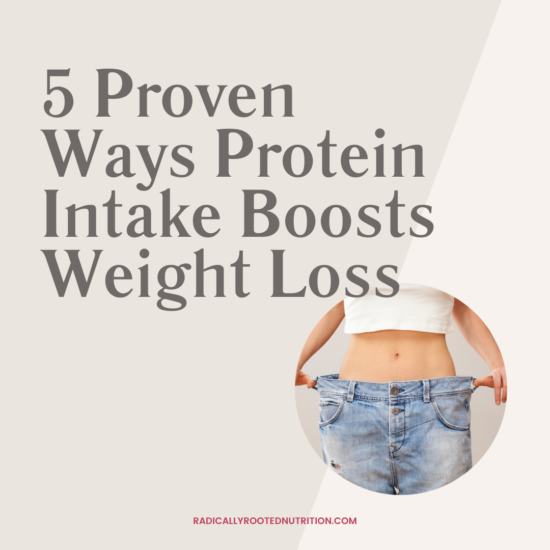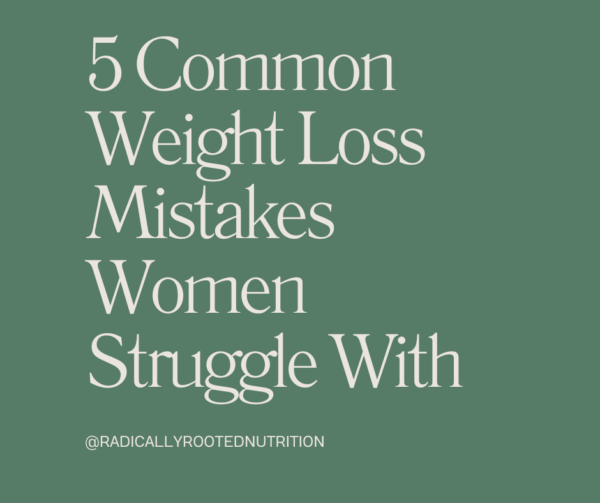5 Proven Ways Protein Intake Boosts Weight Loss
Trying to lose weight can be an extremely stressful process, often leading to confusion and frustration. Despite doing everything they are “supposed to”, many people still struggle to see their weight decrease, and frequently encounter plateaus. However, imagine being able to eat more, feel more satisfied, and still lose weight—sounds great, right? While various factors influence weight loss, one key component to expediting sustainable weight loss is protein intake.
Recently, there has been a significant craze around protein, with countless products boasting ‘high protein’ labels to attract consumers. The truth is, that protein can significantly impact weight loss, but only if it is consumed within our calorie goals. By understanding how protein affects our bodies, we can make informed choices that support our weight loss journey. Let’s explore five ways protein intake impacts weight loss and how to incorporate it effectively into our diet.

How Does Weight Loss Work?
Have you heard the philosophy that weight loss is a “calories in, calories out” game? While this philosophy is true because it forces the body to use stored fat for energy, it is not the only factor that affects weight loss…
Metabolism, the process by which the body converts food into energy, plays a crucial role. If your metabolism is high, you will burn more calories both at rest and during activity. This makes it easier to lose weight. The metabolism can be influenced by diet, exercise, and overall lifestyle. However, other factors that influence weight loss include satiety, muscle mass and hormone levels (just to name a few).
Let’s talk about how protein can influence how weight loss works…
1- Protein Enhances Satiety –
Protein consumption significantly impacts satiety, which is the feeling of fullness after eating. Research has shown that protein intake can enhance feelings of fullness, reduce the desire to eat, and increase fat oxidation (breakdown of fat for energy), contributing to improved satiety in lean and overweight individuals.
Protein, particularly when combined with fiber, is more effective than carbohydrates and fats in promoting this satiety sensation. This effect is partly due to protein’s influence on hunger and fullness hormones, such as increasing levels of satiety (fullness) hormones (PYY and GLP-1) and reducing levels of the hunger hormone ghrelin. The satiating effect of protein can help individuals consume fewer calories throughout the day, without feeling like they are deprived and hungry which is crucial for weight loss.
5 Common Weight Loss Mistakes Women Struggle With Weight loss can feel like navigating a neverending cycle that goes well […]
2- Protein Preserves Muscle Mass
Protein intake is crucial for preserving muscle mass during weight loss. It’s important to understand that weight loss doesn’t always equal fat loss; ideally, we aim to lose fat, not muscle. High-protein diets help preserve lean body mass (LBM) during weight loss. LBM is essential for maintaining resting energy expenditure (REE), which is the number of calories your body burns at rest. By preserving LBM, protein intake helps maintain a higher REE, preventing weight regain. This is particularly important because losing muscle can lead to a decrease in metabolic rate aka daily calorie burn, a phenomenon often referred to as “starvation mode.” So while you are eating fewer calories, the body is compensating by burning less throughout the day which oftentimes leads to weight plateaus which can be extremely frustrating.
Not to mention, we don’t just want to lose weight we want to look good. Preserving our LBM keep us toned and in shape rather than flabby and untoned.
Combining a high protein intake with strength training is recommended to preserve muscle mass and maintain a higher metabolic rate during weight loss.
3- Protein Increases Metabolic Rate
As we just spoke about, preserving muscle mass increases metabolic rate. Muscle is metabolically active, meaning the more muscle we have, the more calories we burn at rest. This is attributed to the high thermic effect and several other factors, making a high protein intake beneficial for boosting metabolism. As a result, you burn more calories around the clock, including during sleep. This increased energy expenditure not only contributes to weight loss but also helps prevent weight regain. By boosting metabolism, a high protein intake ensures that more calories are burned throughout the day, even during periods of rest.
Beyond caloric intake, metabolism and basal metabolic rate are key to weight loss. You can boost your metabolic rate through adequate exercise, a healthy diet rich in protein, strength training, and sufficient sleep.
4- Protein Regulates Weight Related Hormones
Protein plays a significant role in the production of many types of hormones. Many hormones play a huge role in weight regulation. For instance, insulin is a hormone that regulates weight by promoting the storage of glucose as fat and inhibiting fat breakdown, thus influencing fat accumulation. It also affects appetite and satiety signals in the brain, helping to control food intake. Insulin resistance, where the body’s cells become less responsive to insulin, can lead to higher insulin levels, increased fat storage, and weight gain. Protein plays a critical role in regulating insulin sensitivity by supporting muscle mass- a major site for glucose uptake, and by being an essential part of the process that allows insulin to work properly.
Protein’s role in hormone regulation extends to thyroid hormones and reproductive hormones, which also impact weight and metabolism.
As mentioned earlier, increasing protein intake elevates levels of satiety hormones such as GLP-1, peptide YY, and cholecystokinin, while concurrently decreasing levels of the hunger hormone ghrelin.
Hormonal imbalances can occur in conditions such as PCOS and hypothyroidism, and even during menopause, which can hinder your ability to lose weight and keep the weight off.
5- Protein Aids in Weight Maintenance Post Weight Loss
Protein intake is crucial for maintaining weight after shedding pounds. Clinical trials have consistently demonstrated the effectiveness of high-protein diets in preventing weight regain, a phenomenon likely attributable to various factors previously discussed.
A study by Westerterp-Plantenga et al. found that a 20% higher protein intake (18% of energy from protein vs 15%) during a 3-month weight maintenance period after initial weight loss resulted in 50% lower body weight regain compared to the normal protein group.
Long-term studies spanning 6 to 12 months have reported that a high-protein diet is not only effective in weight loss but also serves as a barrier against weight regain post-weight loss. High protein diets show no adverse effects on health, including bone density or renal function in healthy adults.
How to Get More Protein in Your Diet
Even though eating more protein seems simple when you think about it, integrating it into your life and nutrition plan can be difficult. Here are my ready-to-eat protein sources that make increasing my protein intake easy:
- Greek yogurt
- Shrimp
- 99% lean ground chicken or turkey
- Smoked salmon
- Rotisserie chicken
- Beans
- Low sodium deli turkey
- Edamame
- Canned salmon
- Eggs
Bottom Line
In conclusion, protein works on both sides of the “calories in vs calories out” equation. It reduces calories in and boosts calories out. For this reason, it is not surprising to see that high-protein diets lead to weight loss, even without intentionally restricting calories, portions, fat or carbs. Increasing protein intake is a strategic approach to weight loss that leverages protein’s unique properties to enhance satiety, preserve muscle mass, boost metabolism, and regulate key weight-related hormones. All of which can lead to sustained long-term weight loss.




